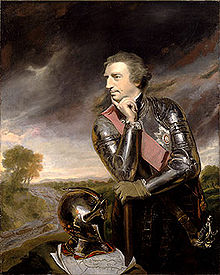Lord Jeffrey Amherst
Field Marshal Jeffery Amherst, 1st Baron Amherst, KB (29 January 1717 – 3 August 1797) served as an officer in the British Army and as Commander-in-Chief of the Forces.
Amherst is best known as the architect of Britain's successful campaign to conquer the territory of New France during the Seven Years' War. Under his command, British forces captured the cities of Louisbourg, Quebec City and Montreal, as well as several major fortresses. He was also the first British Governor General in the territories that eventually became Canada. Numerous places and streets are named for him, in both Canada and the United States.
Amherst's legacy is controversial due to his expressed desire to exterminate the race of indigenous people during Pontiac's War, and his advocacy of biological warfare in the form of gifting blankets infected with smallpox as a weapon. This has led to a reconsideration of his legacy. In 2017, the City of Montreal removed his name from a street in the city. The city of Amherst, Nova Scotia is also considering renaming in light of recent movements to reconsider the naming of "towns, streets and monuments that celebrate past war heroes", as is the town of Amherstburg, Ontario.
Born the son of Jeffrey Amherst (d. 1750), a Kentish lawyer, and Elizabeth Amherst (née Kerrill), Jeffery Amherst was born in Sevenoaks, England, on 29 January 1717. His brothers included Admiral John Amherst and Lieutenant General William Amherst. At an early age, he became a page to the Duke of Dorset. Amherst became an ensign in the Grenadier Guards in 1735.
...
Wikipedia


